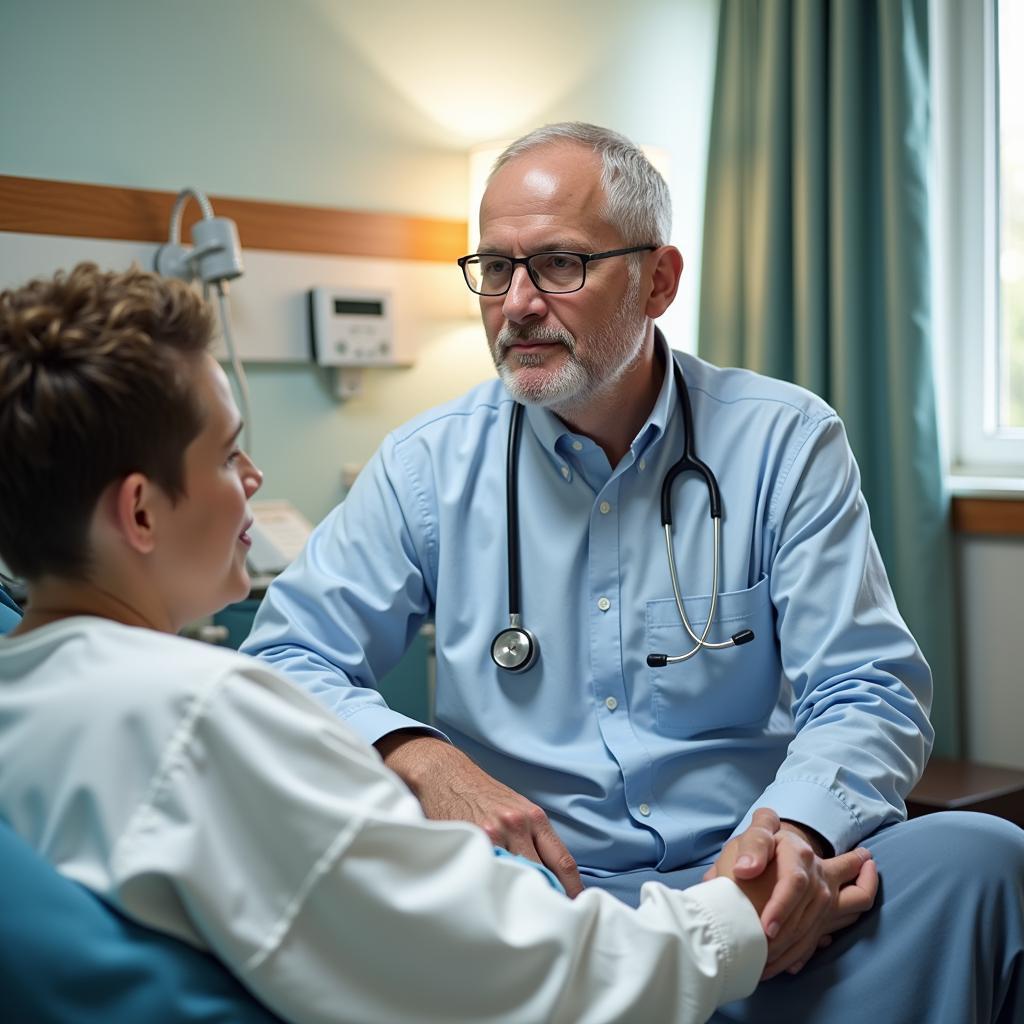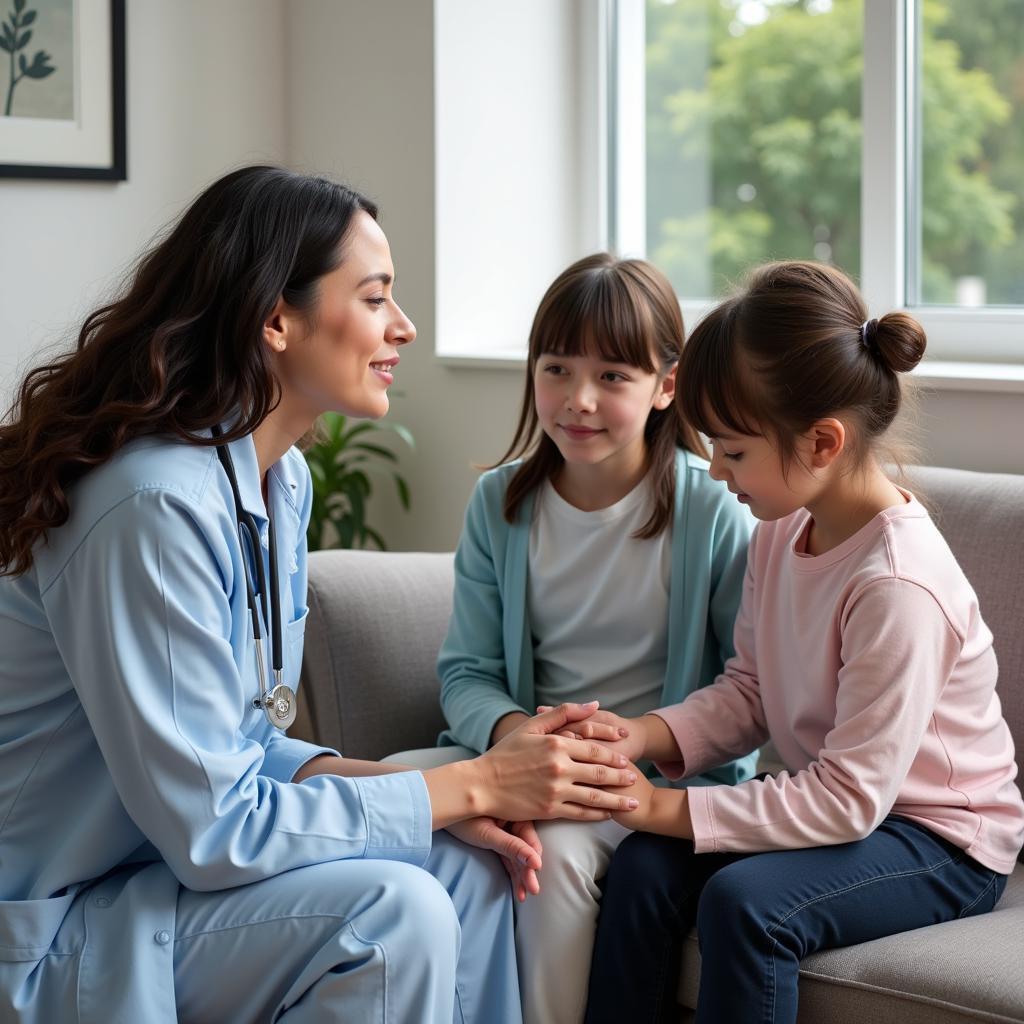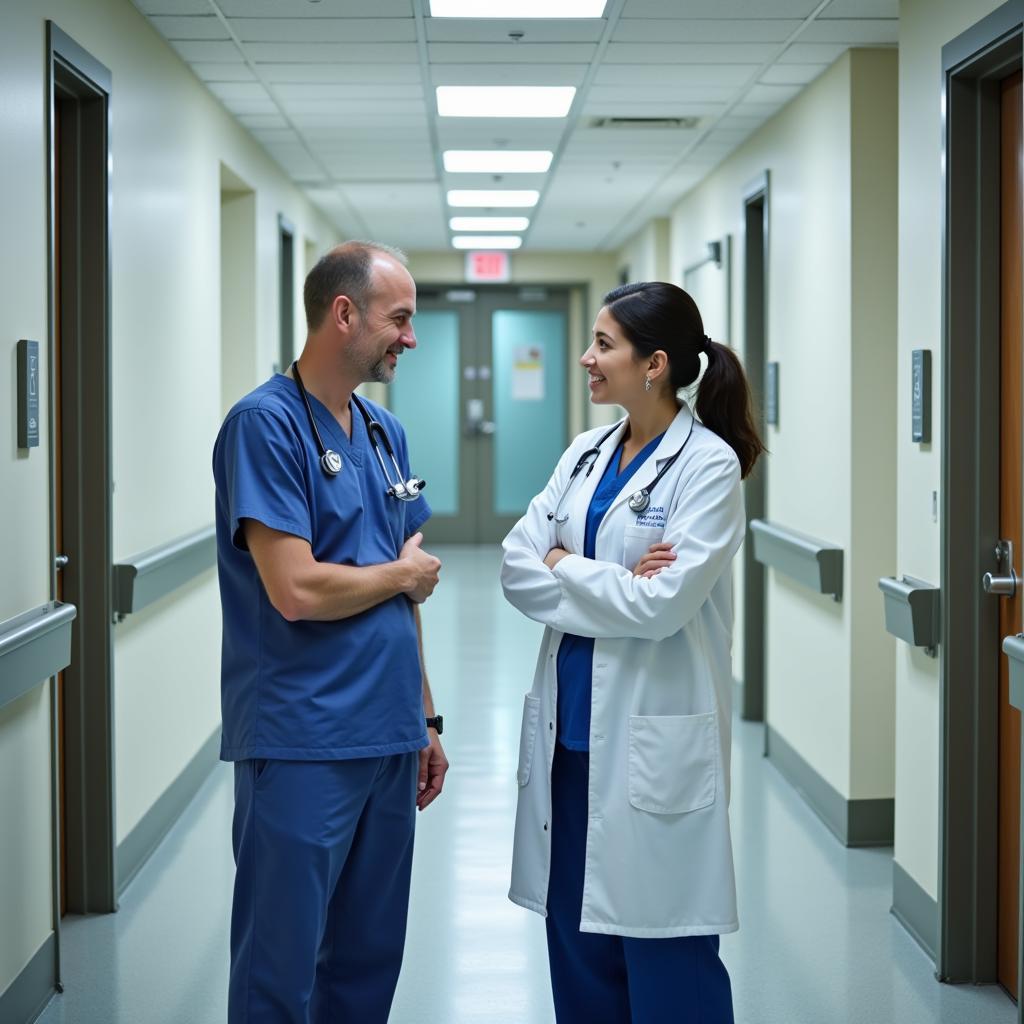Hospital Chaplain Meaning encompasses far more than just a religious presence within a healthcare setting. It signifies a source of emotional, spiritual, and existential support for patients, families, and even staff, regardless of their religious beliefs or background. This role is pivotal in providing comfort and guidance during times of crisis, illness, and loss.
What does a hospital chaplain truly represent? They are trained professionals who offer a listening ear, compassionate presence, and spiritual care to individuals navigating the complexities of health challenges. They provide a safe space for patients to explore their feelings, fears, and hopes, helping them find meaning and purpose amidst difficult circumstances. You can learn more about their roles and responsibilities in our article on what chaplains do in hospital.
Exploring the Role and Responsibilities: What is a Hospital Chaplain?
Hospital chaplains serve diverse populations, offering support that extends beyond traditional religious boundaries. Their primary focus is on addressing the spiritual and emotional needs of individuals facing health crises, regardless of faith or belief system. A chaplain’s presence can be incredibly valuable, particularly for those grappling with life-altering diagnoses, end-of-life decisions, or the loss of a loved one.
They offer a unique form of support that complements the medical care provided by doctors and nurses. This holistic approach acknowledges the interconnectedness of mind, body, and spirit, recognizing that healing encompasses more than just physical recovery. For a deeper understanding of the chaplain’s role within the hospital setting, check out our article on what is a chaplain in a hospital.
 Hospital chaplain comforting a patient
Hospital chaplain comforting a patient
What Does a Hospital Chaplain Do?
Hospital chaplains perform a variety of duties, including providing emotional and spiritual support, facilitating religious rituals, and offering grief counseling. They often work as part of an interdisciplinary team, collaborating with physicians, nurses, social workers, and other healthcare professionals to ensure comprehensive patient care. They offer a non-judgmental space where individuals can express their anxieties, fears, and questions without reservation.
Their ability to actively listen and empathize creates a powerful sense of connection, fostering trust and rapport. They might also assist patients in connecting with their faith community or exploring their spirituality in a broader sense. They can provide access to religious resources or guide individuals in practices such as meditation, prayer, or mindfulness.
Addressing Spiritual Needs: More than Religious Practice
Spiritual care is a central aspect of a hospital chaplain’s work. While some patients may seek religious guidance, others may desire a broader exploration of meaning and purpose. Chaplains are equipped to address these diverse needs, providing support that transcends specific religious doctrines. They help patients grapple with existential questions, explore their values, and find sources of strength and resilience in the face of adversity.
 Hospital chaplain leading a prayer with family members
Hospital chaplain leading a prayer with family members
Hospital Chaplain Meaning: A Beacon of Hope
“The presence of a chaplain offers a sense of grounding and stability in a time of uncertainty and vulnerability,” shares Dr. Eleanor Vance, a leading palliative care specialist. “Their compassionate support can be transformative for patients and families alike.” This highlights the significance of the hospital chaplain meaning, demonstrating their crucial role in providing solace and guidance.
Communicating with Empathy and Understanding
Chaplains are skilled communicators, trained to engage with individuals from all walks of life. They understand that effective communication goes beyond simply exchanging words; it involves active listening, empathetic understanding, and a genuine desire to connect on a deeper level. They strive to create a safe and supportive environment where patients feel comfortable sharing their thoughts and emotions.
 Hospital chaplain counseling a grieving family
Hospital chaplain counseling a grieving family
Beyond Patient Care: Supporting Hospital Staff
Hospital chaplains also provide invaluable support to hospital staff, recognizing the emotional toll that working in a healthcare setting can take. They offer a confidential space for staff to process their experiences, address their concerns, and find coping mechanisms for dealing with stress and burnout. For information about hospital clergy and related roles, see our article on hospital clergy.
“Chaplains are a vital resource for healthcare professionals,” says Reverend Michael Davies, a seasoned hospital chaplain with over 20 years of experience. “They offer a safe space to debrief, process emotions, and find renewal amidst the demands of their work.” This reinforces the essential role that chaplains play in supporting the well-being of the entire hospital community. You can also find valuable information about employment opportunities at Calvary Hospital on our page about Calvary hospital employment.
 Hospital chaplain talking with a doctor
Hospital chaplain talking with a doctor
Conclusion
Understanding the hospital chaplain meaning goes beyond recognizing their religious affiliation. It’s about appreciating their dedication to providing holistic care – emotional, spiritual, and existential – to all who need it within the hospital walls. Their presence offers comfort, guidance, and a sense of hope during times of vulnerability and uncertainty. They are an integral part of the healthcare team, contributing to the overall well-being of patients, families, and staff alike.
FAQ
-
What is the main role of a hospital chaplain?
Providing spiritual and emotional support to patients, families, and staff, regardless of religious background. -
Do I have to be religious to speak with a hospital chaplain?
No, chaplains are available to everyone, regardless of faith or belief system. -
What kind of support can a hospital chaplain provide?
Emotional support, spiritual guidance, grief counseling, and assistance with end-of-life decisions. -
How do I contact a hospital chaplain?
You can usually request a chaplain through your nurse or the hospital’s information desk. -
Are hospital chaplain services confidential?
Yes, conversations with a chaplain are generally considered confidential.
Common Scenarios Where You Might Seek a Chaplain
- Receiving a difficult diagnosis
- Facing a challenging medical decision
- Experiencing grief and loss
- Feeling anxious or overwhelmed
- Seeking spiritual guidance or comfort
Further Resources
- Explore our other articles on spiritual care and chaplaincy.
- Visit our website for more information about our hospital’s chaplaincy services.
Need Support?
Contact us at Phone Number: 02437655121, Email: [email protected] or visit us at Address: No. 298 Cau Dien Street, Minh Khai, Bac Tu Liem, Hanoi, Vietnam. We have a 24/7 customer support team available to assist you.